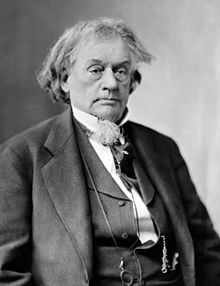Robert Toombs
| Robert Toombs | |
|---|---|
 |
|
| 1st Confederate States Secretary of State | |
|
In office February 25, 1861 – July 25, 1861 |
|
| President | Jefferson Davis |
| Preceded by | Position established |
| Succeeded by | Robert Hunter |
|
United States Senator from Georgia |
|
|
In office March 4, 1853 – February 4, 1861 |
|
| Preceded by | Robert Charlton |
| Succeeded by | Homer Miller |
| Member of the U.S. House of Representatives from Georgia's 8th district |
|
|
In office March 4, 1845 – March 3, 1853 |
|
| Preceded by | Constituency established |
| Succeeded by | Alexander Stephens |
| Personal details | |
| Born |
Robert Augustus Toombs July 2, 1810 Washington, Georgia, U.S. |
| Died | December 15, 1885 (aged 75) Washington, Georgia, U.S. |
| Political party |
Whig (Before 1851) Constitutional Union (1851–1853) Democratic (1853–1885) |
| Alma mater |
University of Georgia Union College University of Virginia |
| Religion | Methodism |
| Military service | |
| Allegiance |
|
| Service/branch |
Georgia Militia |
| Years of service | 1861–63 |
| Rank |
|
| Commands | Toomb' Brigade |
| Battles/wars | |
Robert Augustus Toombs (July 2, 1810 – December 15, 1885) was an American politician who was a founding father of the Confederacy and its first Secretary of State.
A lawyer by training, he proved an impressive speaker in the U.S. House of Representatives, and later in the Senate. Believing strongly in states’ rights and the extension of slavery, he found common ground with fellow-Georgian Alexander H. Stephens. He had supported the Compromise of 1850, but came round to advocating secession. In the newly formed Confederate Government, Toombs was appointed Secretary of State, but criticised the attack on Fort Sumter, which put him at odds with President Jefferson Davis, and he quit to join the Confederate States Army. He became a Brigadier-General, and was wounded at the Battle of Antietam. In 1863, Toombs resigned his commission in the Confederate Army to join the Georgia militia. He was subsequently denied higher promotion and resigned, continuing to feud with Davis to the last. When the war ended, he fled to Cuba, later returning to Georgia. But he refused to request a pardon, thus sacrificing his political future.
Toombs had always made a powerful impression on the public with his emotive oratory, backed by a strong physical presence, but his intemperate habits and volatile personality limited his career potential.
Born near Washington, Wilkes County, Georgia, Robert Augustus Toombs was the fifth child of Catherine Huling and Robert Toombs. He was of English descent. His father died when he was five, and he entered Franklin College at the University of Georgia in Athens when he was just fourteen. During his time at Franklin College, Toombs was a member of the Demosthenian Literary Society, which honors him as one of its most legendary alumni to this day. After the university chastised Toombs for unbecoming conduct in a card-playing incident, he continued his education at Union College, in Schenectady, New York, which he graduated from in 1828; he went on to study law at the University of Virginia Law School in Charlottesville, Virginia. Shortly after his admission to the Georgia bar, Toombs married his childhood sweetheart, Julia Ann DuBois; they had three children.
...
Wikipedia
